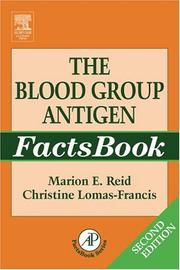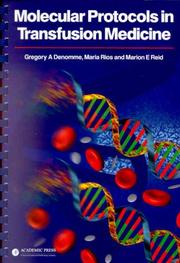| Listing 1 - 4 of 4 |
Sort by
|
Book
ISBN: 1838811052 1838811044 1838811060 Year: 2019 Publisher: IntechOpen
Abstract | Keywords | Export | Availability | Bookmark
 Loading...
Loading...Choose an application
- Reference Manager
- EndNote
- RefWorks (Direct export to RefWorks)
Blood groups, erythrocyte antigens, and transfusion are fundamental areas of medicine and are related to many disciplines of science like hematology, immunology, surgery, and genetics. This book is a collection of information related to blood groups and transfusion, and a practical resource for all concerned physicians. The book is divided into two sections. The first section includes chapters on blood transfusion reactions and hemolytic disease of the fetus. The second section includes information for the future perspectives of blood group antigens. This book will be a stepping stone for scientists who are rapidly advancing their science journey.
Blood groups. --- Blood --- Blood types --- Groups, Blood --- Types, Blood --- Heredity --- Physical anthropology --- Paternity testing --- Groups --- Examination --- Agglutination --- Transfusion --- Medicine --- Hematology --- Health Sciences

ISBN: 9780125865852 0125865856 9786611008338 0080476155 1281008338 1423742494 9781423742494 Year: 2004 Publisher: Amsterdam Boston Elsevier/Academic Press
Abstract | Keywords | Export | Availability | Bookmark
 Loading...
Loading...Choose an application
- Reference Manager
- EndNote
- RefWorks (Direct export to RefWorks)
The second edition of The Blood Group Antigen FactsBook provides key information relating to human red blood cell membrane components carrying blood group antigens, the molecular basis of the antigens, their serological characteristics, and the clinical significance of blood group antibodies. The data on this group of molecules has expanded greatly since the previous edition was published five years ago. Topics include: history and information on terminology, expression, chromosomal assignment, carrier molecule description, molecular basis of antigens, effect of enzymes/chemicals, clini
Blood group antigens --- Blood groups --- Blood --- Blood types --- Groups, Blood --- Types, Blood --- Heredity --- Physical anthropology --- Paternity testing --- Erythrocytes --- Isoantigens --- Groups --- Examination --- Agglutination --- Transfusion

ISBN: 128103276X 9786611032760 0080536905 1435608097 0122093704 9780122093708 9781435608092 9780080536903 9781281032768 Year: 2000 Publisher: San Diego, CA Academic Press
Abstract | Keywords | Export | Availability | Bookmark
 Loading...
Loading...Choose an application
- Reference Manager
- EndNote
- RefWorks (Direct export to RefWorks)
This essential methods manual for immunohematologists (or hematologists and immunohematologists) provides information on genes that encode antigens on red blood cells, platelets and neutrophils. The book begins by covering general concepts in molecular biology and specific protocols such as DNA preparation, PCR-RFLP and allele-specific PCR. Information on the erythrocyte, platelet and neutrophil antigen systems and the molecular basis of polymorphisms are presented clearly in a gene facts sheet format. Database accession numbers and useful adjuncts such as Request forms, worksheets for PCR/enz
Blood. --- Blood groups. --- Blood groups--Handbooks, manuals, etc. Genetic polymorphisms--Handbooks, manuals, etc. Blood--Transfusion--Handbooks, manuals, etc. --- Genetic polymorphisms. --- Hematology. --- Histocompatibility Testing --- Genetic Variation --- Biological Therapy --- Hematologic Tests --- Genetic Phenomena --- Immunologic Tests --- Laboratory Techniques and Procedures --- Therapeutics --- Analytical, Diagnostic and Therapeutic Techniques and Equipment --- Diagnosis --- Phenomena and Processes --- Immunologic Techniques --- Investigative Techniques --- Blood Grouping and Crossmatching --- Polymorphism, Genetic --- Blood Transfusion --- Human Anatomy & Physiology --- Health & Biological Sciences --- Physiology --- Blood groups --- Blood --- Genetic polymorphisms --- Transfusion --- Polymorphisms, Genetic --- Blood types --- Groups, Blood --- Types, Blood --- Groups --- Population genetics --- Body fluids --- Fear of blood --- Heredity --- Physical anthropology --- Paternity testing --- Examination --- Agglutination
Book
Year: 2022 Publisher: Basel MDPI - Multidisciplinary Digital Publishing Institute
Abstract | Keywords | Export | Availability | Bookmark
 Loading...
Loading...Choose an application
- Reference Manager
- EndNote
- RefWorks (Direct export to RefWorks)
Throughout history, wildlife has been an important source of infectious diseases transmissible to humans. Today, zoonoses with a wildlife reservoir constitute a major public health problem, affecting all continents. The importance of such zoonoses is increasingly recognized, and the need for more attention in this area is being addressed. The total number of zoonoses is unknown, some 1,415 known human pathogens have been catalogued, and 62% are of zoonotic origin [1]. With time, more and more human pathogens are found to be of animal origin. Moreover, most emerging infectious diseases in humans are zoonoses. Wild animals seem to be involved in the epidemiology of most zoonoses and serve as major reservoirs for transmission of zoonotic agents to domestic animals and humans [2]. The concept of the ‘One Health’ approach involving collaboration between veterinary and medical scientists, policy makers, and public health officials, is necessary to foster joint cooperation and control of emerging zoonotic diseases [3]. Zoonotic diseases caused by a wide range of arthropods, bacteria, helminths, protozoans, and viruses can cause serious and even life-threatening clinical conditions in animals, with a number of them also affecting the human population due to their zoonotic potential. The aim of the current Special Issue is to cover recent and novel research trends in zoonotic diseases in wildlife, including the relevant topics related to wildlife, zoonosis, public health, emerging diseases, infectious diseases and parasitic diseases.
west nile virus --- arbovirus --- zoonotic --- macaque --- bats --- c-ELISA --- RT-PCR --- Anaplasma phagocytophilum --- zoonosis --- tick --- wild ungulates --- phylogenesis --- molecular epidemiology --- Coxiella burnetii --- Q fever --- serology --- epidemiology --- wildlife --- European bison --- micromammals --- Cryptosporidium --- Giardia --- Blastocystis --- Enterocytozoon bieneusi --- Balantioides coli --- Troglodytella --- non-human primates --- rats --- zoological garden --- one health --- Helicobacter spp. --- PCR --- Sus scrofa --- Meles meles --- badger --- tuberculosis --- Mycobacterium tuberculosis complex --- P22 ELISA --- isolation --- cattle --- Atlantic Spain --- filter card --- faeces --- transportation --- storage --- preservation --- Giardia duodenalis --- Cryptosporidium hominis --- seroprevalence --- ruminants --- humans --- dust --- aerosols --- Salmonella --- turtles --- wildlife rescue centres --- camera-traps --- interactions --- wildlife-livestock interface --- non-tuberculous mycobacteria --- Leptospira interrogans --- microscopic agglutination test --- Slovenia --- n/a
| Listing 1 - 4 of 4 |
Sort by
|

 Search
Search Feedback
Feedback About UniCat
About UniCat  Help
Help News
News